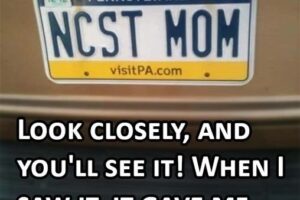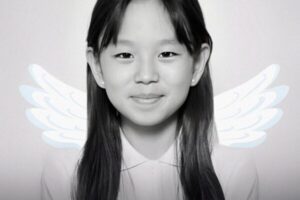I never imagined I’d be a widower at 35. Elizabeth was my anchor. The car crash stole her in an instant, and I was thousands of miles away when it happened—unable to get home in time for the funeral. Five years of marriage, two little girls, and suddenly she was gone. My mother-in-law called, voice shaking, telling me how our daughters, Sophie, four, and Emma, five, kept asking where “Mommy” was. How do you explain something you’re still trying to understand yourself?
I went straight to the cemetery after my flight landed, hollowed out by grief and barely aware of anything around me. As I walked back to the car, something prickled at the edge of my awareness—like someone was watching. I turned and saw an old woman near the gate, her face carved with deep lines, her eyes unnervingly sharp. There was an odd stillness about her. Before I could decide whether to ignore her, she called softly, “Excuse me.”
I kept walking. I had nothing left to give. She stepped closer. “I know your fate,” she said, low and steady.
I stopped. “What?”
“Cross my palm with silver and I’ll show you the joys and sorrows ahead,” she replied, holding out a thin, wrinkled hand.
A fortune-teller at a funeral. I rolled my eyes inwardly. “I’m not interested,” I muttered, and was turning away when she stopped me again. “Elizabeth won’t rest until justice is served.”
Those words made me turn back. Her fingers curled, beckoning. “Twenty dollars. That’s all.”
Normally I’d have brushed her off. That day I was too numb to care. I handed her a crumpled bill. Her hand was cold when she took mine, and her gaze pierced right through whatever armor I thought I had. For a second I felt exposed—like she could see every fresh wound.
“Today you lost someone dear,” she whispered.
“Yeah. No kidding,” I snapped, bitterness rising. “We’re outside a cemetery.”
She didn’t flinch. “Your wife’s death was no accident.”
A chill crawled up my spine. “What do you mean?”
“There’s more to it than you know. Tomorrow the truth will begin to unravel.” She smiled then—a slow, unsettling curve of her lips. “By this time tomorrow, you’ll see.” And just like that, she melted into the mist, gone before I could ask another question.
For a moment I stood there, torn between anger and a quiet, creeping unease. Part of me wanted to dismiss her as a charlatan playing on grief. Another part—something raw and aching—couldn’t stop replaying her words.
That night I lay awake, Elizabeth’s face behind my eyelids. Her laugh. The way she’d say goodnight to the girls. Her absence was a physical ache. Her death being “no accident” floated in the corners of my thoughts, refusing to be shoved away.
I got up and went through her things. Her purse, her notebooks, her clothes—memories in every fold. Then I found the receipts: car rental paperwork. We had two cars. Why was she renting one?
The fortune-teller’s voice echoed in my mind: There’s more to her death than you know. I stared at the papers, heart thudding. Had she been hiding something? Or had someone been hiding something from her?
The next morning I called Sarah, Elizabeth’s best friend who worked at the garage where we brought our cars. I tried to sound composed. “Hey, Sarah. Did Elizabeth ever mention renting a car?”
There was a pause. “Actually, yes. For a beach outing. You remember—you brought both your cars in for service.” I’d been too deep in grief to even notice.
“Why didn’t she tell me?” I asked.
“She wanted it to be a surprise,” Sarah said. “She said she’d return it after the trip. I can give you their number.”
I drove to the rental company. The manager pulled up the records. “Her sister Karen returned it,” he said. “No visible damage. It hadn’t been driven much—only a few miles added.”
Karen. The woman who had been there after the accident, offering comfort. The one who sat with me in the early fog of grief. Why was she returning the car? Why had she taken the time to fix it—or had she? None of it made sense.
I went to the police. I told them everything—the receipts, the rental, and even the fortune-teller’s eerie prediction, because at that point I was trying to grasp anything that could explain the gnawing suspicion in my gut.
The officer listened. “Initially we treated it as a tragic accident,” he said. “Brake failure, no witnesses. We closed the scene because there was nothing to suggest foul play.” But now, with new questions, they agreed to look again.
Days blurred. I replayed every interaction with Karen, every sympathetic word, every “let me know if you need anything.” I kept going back to the fact that she returned the rental car herself and had apparently repaired whatever issue existed before presenting it as harmless.
The investigation turned. When the police inspected the rental car, they found clear evidence of tampering with the brakes. My stomach sank. It wasn’t an accident.
Then came the bigger blow. They discovered that Karen had taken out a life insurance policy on Elizabeth months earlier, forging her signature and naming herself the sole beneficiary. The betrayal was poisonous. The person who had comforted me, who had sat at our table, had plotted the most intimate kind of violence—all for money, to settle debts and fund a lifestyle she couldn’t sustain otherwise.
When they arrested her, I couldn’t meet her eyes. The woman who had brought casseroles, pretended to help plan things, had been the architect of Elizabeth’s death. Under interrogation, she confessed. She’d sabotaged the car to make it fail, staging it to look like a tragic mechanical issue. She was counting on the insurance payout to fix her own financial mess.
The fortune-teller’s words came back to me—not as a spooky coincidence, but as something like a compass that had nudged me toward the truth. Elizabeth hadn’t been able to rest because her death had been crafted. Cold. Calculated. By someone we had trusted.
Karen was sentenced to life. It didn’t bring Elizabeth back, but sitting in that courtroom as the verdict was read, a hollowed part of me found a measure of justice. She would never be able to hurt anyone that way again.
Weeks later, I found myself at the cemetery again. The air was sharp, leaves crunching underfoot. I stood by Elizabeth’s grave longer than I intended, thinking about the mysterious woman who had stopped me at the gate. I whispered, “You can rest now,” and a butterfly drifted down to rest briefly on the headstone. I let myself believe it was her, finally at peace.
I never saw the fortune-teller again, but I kept thinking about that $20 and her words. They had sent me down a path I never would’ve walked willingly, but in the end, they brought me the truth. And the truth—terrible as it was—was worth every bit of the pain it took to reach it.



